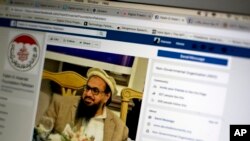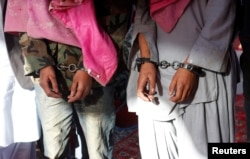In an effort to combat extremism online, Pakistan's government has launched an application that will allow its citizens to report websites that publish extremist content and hate speech.
Called Surfsafe, it was developed by Pakistan's National Counter Terrorism Authority (NACTA) and works in both Android and iOS devices.
NACTA is a government body responsible for designing the country's counterterrorism strategies.
"Strict enforcement of cybercrime laws is absolutely necessary to overcome this massive challenge of online extremism. Surfsafe is a step in that direction," Ehsan Ghani, NACTA's director, told VOA.
"People, unfortunately, at times get attracted to extremist ideologies without even realizing it. Through this program [application], we will create awareness and block online materials involved in provoking extremism in any capacity," Ghani added.
Numerous militant, sectarian and radical groups continue to operate online in Pakistan despite the country's strict cybercrime laws.
Officials are optimistic that Surfsafe will help them rein in websites that promote extremist ideologies. The application is part of the implementation of the National Action Plan, a 20-point strategy adopted by Pakistan in 2015 to crack down on terrorism and extremism in the country.
The NAP reiterates that militant groups, under any circumstances, must not be allowed to use the internet as a propaganda tool.
Daunting task
Social media experts in Pakistan say restricting the presence of terrorists on the internet is a daunting task because militant networks have become more tech savvy in recent years.
"We do not think such initiatives of cosmetic nature will do any good," Shahzad Ahmad, director of Bytes for All, a Pakistani digital rights advocacy group, told VOA.
"Extremist groups have hired cyberarmies in large numbers which are being used to manipulate democratic discourse, stifle political expression and undermine fundamental rights in cyberspace," he added.
Selective usage
Nighat Dad, the executive director of the Digital Rights Foundation, a Pakistani nongovernmental organization that helps people cope with online abuse, told VOA that online extremism is a global issue. "It becomes more complex in Pakistan because the government has no political will to deal with it," Dad said.
"The government needs to have their priorities right. They crack down on activists vocal about the government, military and the state despite those who're using internet for their dark purposes," she added.
According to Bytes for All, despite government's initiatives and cybercrime laws, militants continue to easily reach millions of internet users in the country through their high-tech networks.
A detailed investigative report published in the English daily Dawn last year noted 41 of the 64 banned terror organizations, such as Tehreek-e-Taliban Pakistan, Jamaat-ul-Ahrar, Sipah-i-Sahaba and Ahle Sunnat Wal Jamaat, operate on social media openly. Hundreds of their personal and group pages are accessible to millions of users on Facebook and Twitter.
The report further noted that these pages are regularly updated with photos and videos in the Urdu language and urge people to get in touch for information or recruitment purposes. A majority of these pages are reportedly managed by radical religious groups who openly show sympathy and support for different terror networks.
Social media companies
Pakistan's government last year announced it would ask major social media companies such as Facebook and Twitter to block pages promoting "hatred," "violence" and "blasphemy."
"In order to enforce Surfsafe fully, the government will continue to contact social media networks to take down pages and accounts involved in inciting hatred and terror," Ghani told VOA. "This is a matter of our national security."
Major social media companies have shown the will to urgently tackle extremist contents online. Twitter last year announced it had suspended 376,890 accounts globally that were promoting violence and terrorism.
According to the Pakistan Telecommunication Authority, about 51 million of the country's 190 million people have internet access. Officials express concern that militant groups continue to reach and lure youth.
Last year in April, Pakistani authorities arrested a woman named Naureen Laghari who wanted to target a Christian gathering on Easter Eve in Lahore. The young woman had been recruited by the Islamic State group through social media networks. She had reportedly gone to Syria to get military training.
Tackling them physically
Some critics charge that unless the government stops the terrorist groups' activities on the ground, silencing them on the internet would not be that effective.
"Our leaders should denounce extremism, but what we see is that many are hand in hand with extremists either in the name of religion or for their own political agendas," Shahzad Ahmad of Bytes for All said. "This needs to be stopped if the country is serious [about stopping] cyberextremism."







